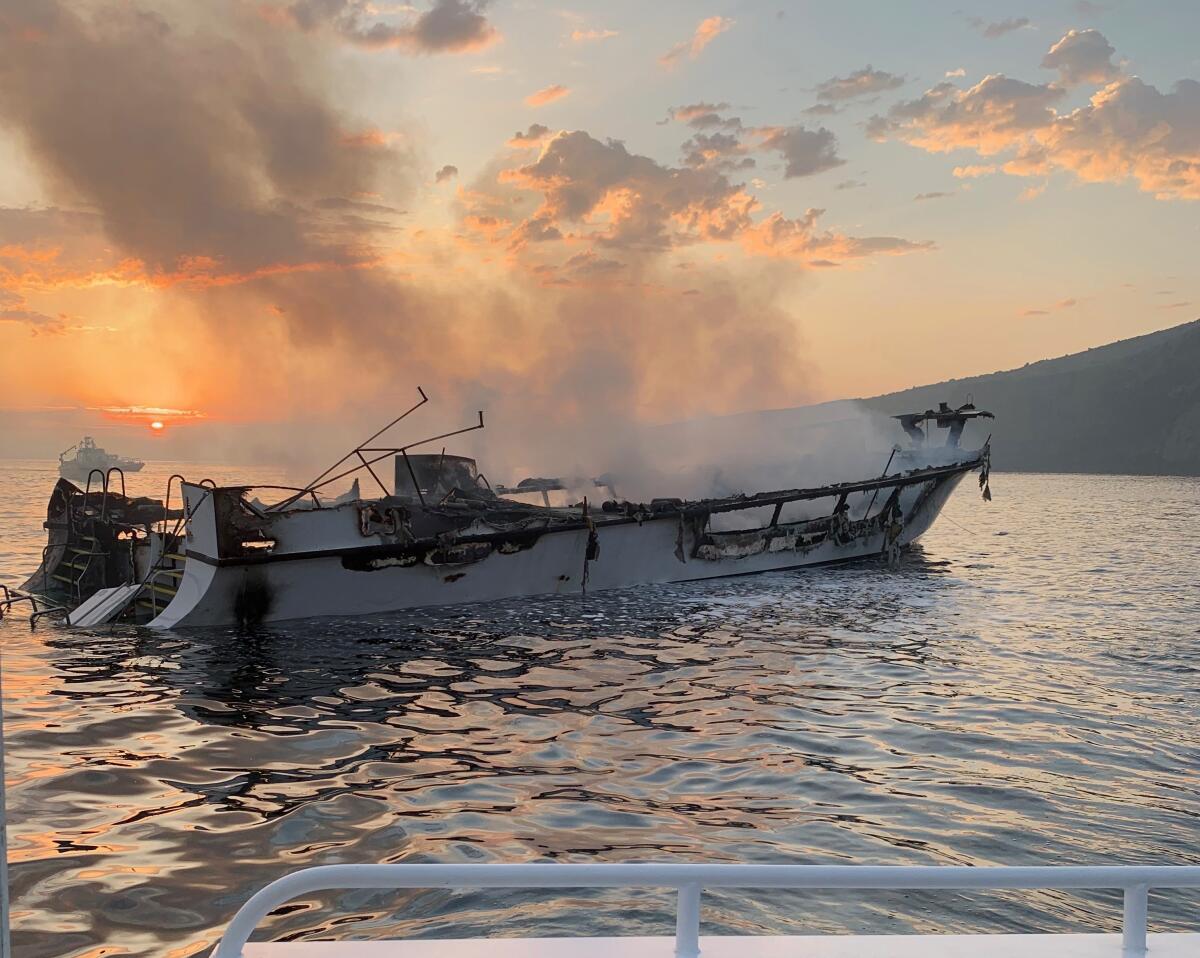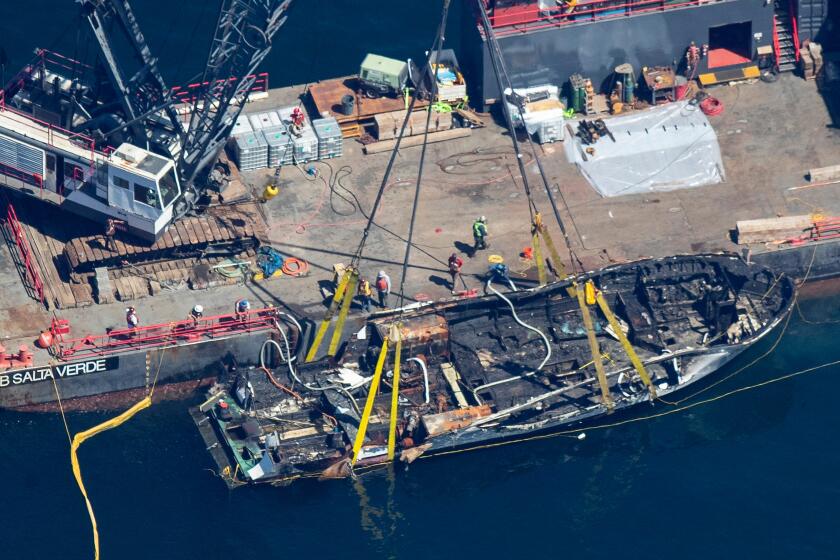Coast Guard issues safety bulletin on battery charging, preparedness after California boat fire

SANTA BARBARA — The Coast Guard has issued new emergency safety requirements to passenger vessels in the wake of the Labor Day boat fire off Santa Cruz Island that killed 34 people.
The bulletin recommended that commercial boat operators nationwide review safety measures, make sure safety equipment is operational and reduce potential hazards from lithium batteries, power strips and extension cords.
The cause of the worst maritime disaster in recent California history has not been determined. But there have been questions about whether the fire started at a charging station used by passengers for phones and other electronics in the galley or because of some lithium battery malfunction.
A commercial diving boat caught fire near the shoreline of Santa Cruz Island, Calif., early Monday. Many aboard the boat were believed to be sleeping below deck when the fire broke out in the pre-dawn hours.
Federal investigators from the FBI, the Bureau of Alcohol, Tobacco, Firearms and Explosives, and the U.S. Coast Guard have spent the last two days searching the Santa Barbara Harbor office of Truth Aquatics, the operator of the dive boat Conception. The FBI on Tuesday also asked the public for any information — including videos and photos — about the boat.
The fire broke out during a weekend diving expedition, trapping the victims, who were sleeping below deck. Five crew members who were on deck at the time were able to escape but said the fire was too intense to get anyone else out.
Investigators have been looking into possible shortcomings in the way the Conception was operated. Law enforcement sources told The Times last week that a preliminary investigation suggested serious safety deficiencies aboard the Conception.
They said the vessel lacked a “roaming night watchman” to remain awake to alert passengers of fire or other danger; some of the surviving crew members told investigators they didn’t have adequate training to handle a major emergency; and passengers may not have received thorough safety briefings.

In the aftermath of the Conception deaths, the Coast Guard is now scrutinizing vessels more closely, according to a source who asked for anonymity to speak openly about the federal investigation. The Coast Guard is “detaining” vessels for potential fire and safety issues that didn’t draw attention until the Sept. 2 fire, said another source who is not authorized to speak publicly on the matter.
Dan Salas, the CEO and owner of Harbor Breeze Cruises in Long Beach, said the Coast Guard conducted annual safety inspections of his vessels on Monday. Salas said he noticed an immediate change in how the Coast Guard examined his vessels, which include the 500-passenger Sir Winston.
“We entered into a whole new world,” Salas said, offering condolences for the Conception victims. “It’s not just a routine safety inspection anymore. There was a higher level of scrutiny to firefighting equipment and emergency access. We can’t take anything for granted. We fully support the Coast Guard regulations.”
He ordered his employees to review safety procedures on his nine vessels and to make sure each worker is properly trained. Salas said the Conception tragedy “has rocked the marine industry to its core” and he has had difficulty sleeping at night since the accident.
“We are fully aware of the importance of safety,” Salas said. “All vessel owners are taking this seriously. Safety is our main concern when we are in the ocean.”
The Coast Guard’s new safety requirements recommend operators of passenger vessels:
—Review the routes and conditions listed on their vessel’s Certificate of Inspection, including the number of passengers and overnight passengers permitted; ensure that crew members are aware of and clearly understand their obligations, including any additional requirements detailed on the certificate.
— Review emergency duties and responsibilities with the crew to ensure they comprehend and can comply with their obligations in an emergency, including passenger safety orientation, and ensure that emergency escapes are clearly identified, functional and remain clear of objects that may impede egress.
— Review the vessel log book and ensure that records of crew training, emergency drills and equipment maintenance are logged and current. Additionally, it is recommended that operators complete log entries to demonstrate to the Coast Guard that their vessel is operating in compliance with routes and conditions of their certificate.
— Ensure all required firefighting and lifesaving equipment is on board and operational.
— Reduce potential fire hazards and consider limiting the unsupervised charging of lithium-ion batteries and extensive use of power strips and extension cords.
— Review the overall condition of the passenger accommodation spaces and any other space that is readily available to passengers during the voyage for unsafe practices or other hazardous arrangements.
There are multiple investigations into the disaster, looking at such issues as what caused the fire and why the passengers could not escape.
One surviving crew member told a boater who helped rescue him that he thought the fire started in the galley, where cellphones and cameras had been plugged in to recharge overnight.
The designer of the Conception told The Times that he believed the fire began in the belly of the boat and involved lithium battery chargers.
Authorities said it could take a year to complete the investigation. But issuing the safety bulletin was seen as an urgent first step.
“In some instances, our marine casualty boards identify pressing safety issues related to vessel stability, the engine room, or lifesaving and firefighting equipment,” the Coast Guard said in a statement. “In those instances, we issue safety alerts or bulletins to ensure a widespread dissemination of the most recent safety guidance.”
The Coast Guard established a formal Marine Board of Investigation to investigate the fire. The procedure is the Coast Guard’s highest-level marine casualty investigation. The panel of four board members will investigate all aspects of the incident.
More to Read
Sign up for Essential California
The most important California stories and recommendations in your inbox every morning.
You may occasionally receive promotional content from the Los Angeles Times.














